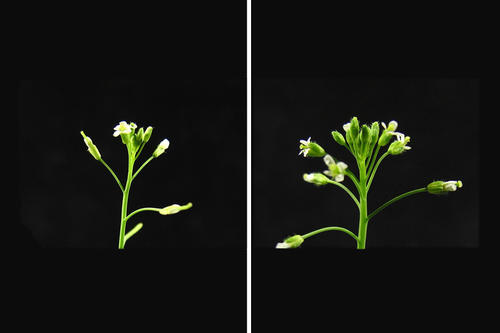The Fruits of Research
Researchers at Freie Universität discover genes that boost crop yields
Sep 29, 2011
Less is more: targeted deactivation of genes that break down the hormone cytokinin triggers a sharp rise in seed yield in Arabidopsis thaliana (right).
Image Credit: DCPS
“Less is more” is an apt motto to describe recent findings by plant researchers at the Dahlem Centre of Plant Sciences at Freie Universität Berlin that could break new ground in plant cultivation: The research group headed by Professor Thomas Schmülling and Junior Professor Tomàš Werner has been able to show that targeted deactivation of genes that break down the hormone cytokinin triggers a sharp rise in seed yields.
Boosting crop yields has been one of the main concerns of plant cultivators since time immemorial. Today, it remains one of the top agenda items for the global agriculture sector. Not only do we rely on plants as a source of food and feed, but they are also becoming increasingly important as renewable raw materials for energy generation and industrial uses. As the global population surges, demand for plant-based products is expected to rise steadily.
Plant yields cannot be increased by changing one single gene, however. Yield is a complex property that is influenced by a large number of genes. At the same time, every gene makes only a small contribution to the overall yield, which makes it difficult to achieve large increases by modifying one or a few genes. Plant growers have to produce and study a large number of plants with different combinations of genes in order to pinpoint the right combination. The average increase in yield that is typically achieved using this method is between one and two percent per year.
This makes the findings of researchers in the Department of Applied Genetics at Freie Universität Berlin, published recently in the prestigious journal Plant Cell, even more astonishing: Targeted deactivation of two genes in the model plant Arabidopsis thaliana, also commonly known as thale cress – a favored model among geneticists – yielded 55 percent more seeds in the modified plants than in untreated plants.
Both of the genes are responsible for breaking down the growth hormone cytokinin. If they are deactivated, cytokinin remains active in the plant longer and in larger quantities than usual. During their studies, researcher Isabel Bartrina and doctoral candidate Elisabeth Otto observed that as a result, the cells in a sprout’s growth centers divide more frequently, so more flowers and ovules form. Their growth, too, is promoted by cytokinin, so more seeds are ultimately produced.
The further research projects being performed by Thomas Schmülling on this topic will receive funding from the German Federal Ministry of Education and Research (BMBF) in the future as part of a national initiative focusing on plant biotechnology. Another of the projects’ aims is to investigate the extent to which the results found with the model plant Arabidopsis are also applicable to other plants. The rape plant, used for its oil, is the first choice. “Rape is quite closely related to our model plant, with similarities in how the flowers form and in their structure. As a result, we think there is a very good chance that the project will be successful,” Schmülling says. A biotech company and a plant grower are also involved. The findings of a Japanese research group that also identified a gene responsible for breaking down cytokinin as one of the main factors responsible for regulating yields in rice some years ago, also give reason to hope that the results could be important for other crops as well.
So is the growth hormone cytokinin the crucial factor that growers have been looking for all this time? In fact, it is entirely possible that today’s crops, the product of years of selection, already carry the critical mutations. That means nature itself might have already made some tweaks, and growers are now exploiting them without knowing the molecular details – old-school genetic engineering, if you will. But that won’t be clear until further experiments are performed, this time with a different motto: “You never know until you try.”
Further Information
- Prof. Dr. Thomas Schmülling, Dahlem Centre of Plant Sciences, Freie Universität Berlin, Tel.: +49 (0)30 / 838-55808, Email: tschmue@zedat.fu-berlin.de
- Prof. Dr. Tomáš Werner, Dahlem Centre of Plant Sciences, Freie Universität Berlin, Tel.: +49 (0)30 / 838-56796, Email: tower@zedat.fu-berlin.de

